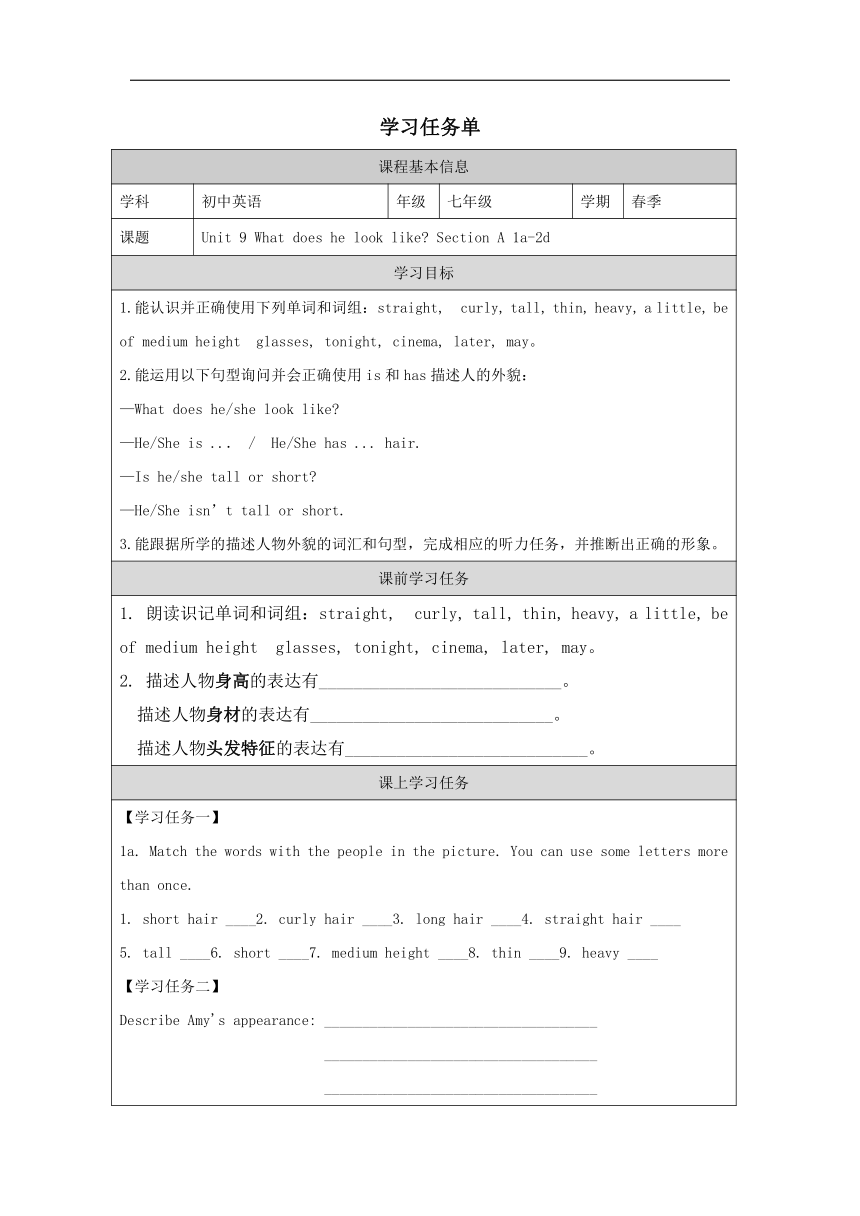Unit 9 What does he look like Section A 1a—2d 学习任务单(表格式)人教版七年级下册
文档属性
| 名称 | Unit 9 What does he look like Section A 1a—2d 学习任务单(表格式)人教版七年级下册 |

|
|
| 格式 | docx | ||
| 文件大小 | 20.1KB | ||
| 资源类型 | 教案 | ||
| 版本资源 | 人教新目标(Go for it)版 | ||
| 科目 | 英语 | ||
| 更新时间 | 2024-04-25 10:52:01 | ||
图片预览

文档简介
学习任务单
课程基本信息
学科 初中英语 年级 七年级 学期 春季
课题 Unit 9 What does he look like Section A 1a-2d
学习目标
1.能认识并正确使用下列单词和词组:straight, curly, tall, thin, heavy, a little, be of medium height glasses, tonight, cinema, later, may。 2.能运用以下句型询问并会正确使用is和has描述人的外貌: —What does he/she look like —He/She is ... / He/She has ... hair. —Is he/she tall or short —He/She isn’t tall or short. 3.能跟据所学的描述人物外貌的词汇和句型,完成相应的听力任务,并推断出正确的形象。
课前学习任务
朗读识记单词和词组:straight, curly, tall, thin, heavy, a little, be of medium height glasses, tonight, cinema, later, may。 描述人物身高的表达有____________________________。 描述人物身材的表达有____________________________。 描述人物头发特征的表达有____________________________。
课上学习任务
【学习任务一】
1a. Match the words with the people in the picture. You can use some letters more than once. 1. short hair ____2. curly hair ____3. long hair ____4. straight hair ____ 5. tall ____6. short ____7. medium height ____8. thin ____9. heavy ____ 【学习任务二】
Describe Amy's appearance: ____________________________________ ____________________________________ ____________________________________ Describe the girl’s appearance: ____________________________________ ____________________________________ ____________________________________ 【学习任务三】 1b. Listen and fill in the blanks. A: Is that your friend B: No, it isn't. A: What does he look like Is he tall or short B: Well, he's really ___________.And he has ________________. 【学习任务四】 2a. Listen and answer the questions. Is David tall or short __________________ 2. Does Sally have long or short hair _________________ 3. Is Peter tall or short _________________ 以上问句均为________疑问句。 【学习任务五】 ① 2d. Listen and choose the right answer. 1. When are they meeting at the cinema A. At 6:00. B. At 7:00. C. At 8:00. 2. How many people are going to the cinema A. Two. B. Three. C. Four. 3. What does David look like A. He has black hair. B. He is short. C. He wears glasses. ② 2d. Read after the tape and then role-play the conversation. 【学习任务六】 Pair work: Make a dialogue with your partner and guess who is your partner’s good friend. Dialogue pattern: —What does your friend look like —He/She … —Does/Is he/she …or ... —He/She ... —Is it … —Yes, you are right./No, it isn’t. My good friend is…
课程基本信息
学科 初中英语 年级 七年级 学期 春季
课题 Unit 9 What does he look like Section A 1a-2d
学习目标
1.能认识并正确使用下列单词和词组:straight, curly, tall, thin, heavy, a little, be of medium height glasses, tonight, cinema, later, may。 2.能运用以下句型询问并会正确使用is和has描述人的外貌: —What does he/she look like —He/She is ... / He/She has ... hair. —Is he/she tall or short —He/She isn’t tall or short. 3.能跟据所学的描述人物外貌的词汇和句型,完成相应的听力任务,并推断出正确的形象。
课前学习任务
朗读识记单词和词组:straight, curly, tall, thin, heavy, a little, be of medium height glasses, tonight, cinema, later, may。 描述人物身高的表达有____________________________。 描述人物身材的表达有____________________________。 描述人物头发特征的表达有____________________________。
课上学习任务
【学习任务一】
1a. Match the words with the people in the picture. You can use some letters more than once. 1. short hair ____2. curly hair ____3. long hair ____4. straight hair ____ 5. tall ____6. short ____7. medium height ____8. thin ____9. heavy ____ 【学习任务二】
Describe Amy's appearance: ____________________________________ ____________________________________ ____________________________________ Describe the girl’s appearance: ____________________________________ ____________________________________ ____________________________________ 【学习任务三】 1b. Listen and fill in the blanks. A: Is that your friend B: No, it isn't. A: What does he look like Is he tall or short B: Well, he's really ___________.And he has ________________. 【学习任务四】 2a. Listen and answer the questions. Is David tall or short __________________ 2. Does Sally have long or short hair _________________ 3. Is Peter tall or short _________________ 以上问句均为________疑问句。 【学习任务五】 ① 2d. Listen and choose the right answer. 1. When are they meeting at the cinema A. At 6:00. B. At 7:00. C. At 8:00. 2. How many people are going to the cinema A. Two. B. Three. C. Four. 3. What does David look like A. He has black hair. B. He is short. C. He wears glasses. ② 2d. Read after the tape and then role-play the conversation. 【学习任务六】 Pair work: Make a dialogue with your partner and guess who is your partner’s good friend. Dialogue pattern: —What does your friend look like —He/She … —Does/Is he/she …or ... —He/She ... —Is it … —Yes, you are right./No, it isn’t. My good friend is…
同课章节目录
- Unit 1 Can you play the guitar?
- Section A
- Section B
- Unit 2 What time do you go to school?
- Section A
- Section B
- Unit 3 How do you get to school?
- Section A
- Section B
- Unit 4 Don't eat in class.
- Section A
- Section B
- Unit 5 Why do you like pandas?
- Section A
- Section B
- Unit 6 I'm watching TV.
- Section A
- Section B
- Review of Units 1-6
- Unit 7 It's raining!
- Section A
- Section B
- Unit 8 Is there a post office near here?
- Section A
- Section B
- Unit 9 What does he look like?
- Section A
- Section B
- Unit 10 I'd like some noodles.
- Section A
- Section B
- Unit 11 How was your school trip?
- Section A
- Section B
- Unit 12 What did you do last weekend?
- Section A
- Section B
